Prof Mayekiso steers UMP's success
Men as allies: Driving gender equity
Denise Sonny: leading global transformation



Prof Mayekiso steers UMP's success
Men as allies: Driving gender equity
Denise Sonny: leading global transformation


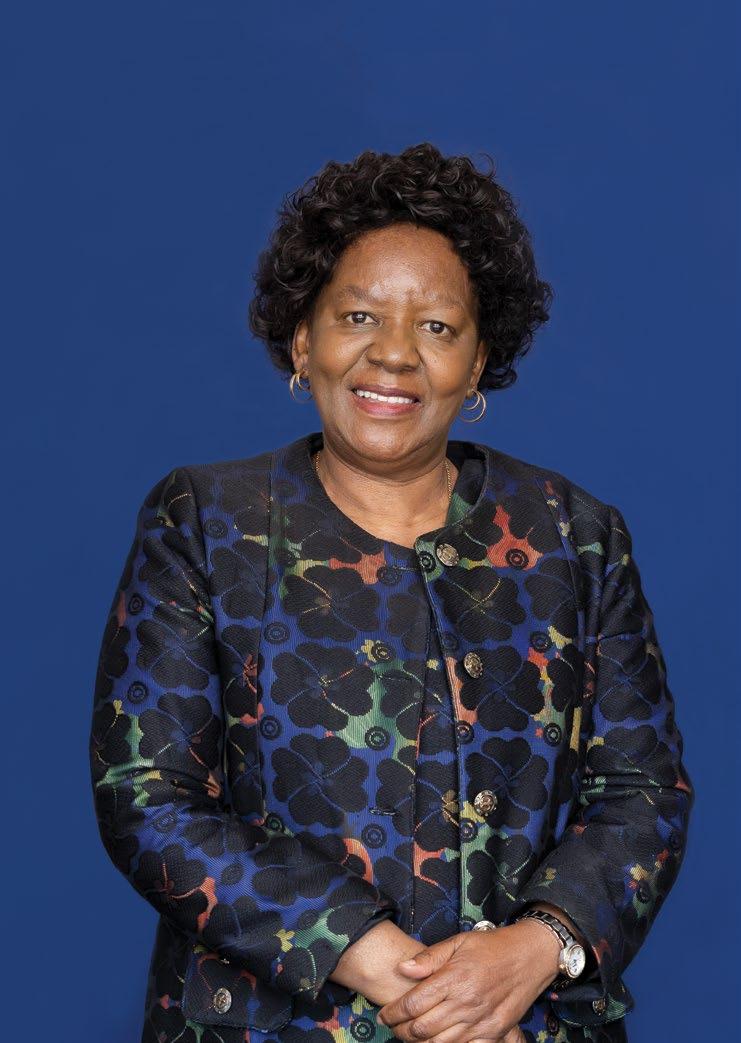
Professor Thoko Mayekiso has led the University of Mpumalanga (UMP) with distinction since its founding in 2014, guiding its transformation into a nationally recognised institution. Under her leadership, UMP continues to drive innovation, student empowerment, and regional impact. As she’s just recently been awarded the Enactus South Africa Champion for 2025, we decided to gain some insight into her leadership philosophy, institutional priorities, and vision for higher education in South Africa.
PROFESSOR THOKO MAYEKISO VICE-CHANCELLOR OF THE UNIVERSITY OF MPUMALANGA
You’ve just won the Enactus South Africa Champion Award for your outstanding leadership. This prestigious award has only been given five times in Enactus history. What does it mean to you, personally, to be recognised among such distinguished company?
I am deeply honoured by this recognition from Enactus South Africa. Knowing that this award has only been presented to five outstanding individuals in the organisation’s history makes it all the more meaningful. It is a humbling affirmation of the leadership and support I have offered to students involved in Enactus over the years.
This award is not just a personal achievement; it represents the dedication, hard work, and excellence of everyone who has been part of our Enactus journey. I am proud that in the eight years since we began competing, UMP students have consistently performed at an exceptional level.
Receiving this award is both an inspiration and a validation of the decision to establish the Enactus team at UMP. It underscores the importance of consistency, vision, and the relentless pursuit of excellence – values that we hold dear at UMP. It is truly gratifying to see these efforts recognised in such a meaningful way.

Our vision: “To be an African University leading in creating opportunities for sustainable development through innovation.”
Which leadership decisions do you believe contributed to you receiving the Enactus South Africa Champion Award in 2025?
My involvement with Enactus began in 2011 as Deputy Vice-Chancellor: Research and Engagement at Nelson Mandela University. After meeting with Ms Letitia de Wet, CEO of SA Enactus, I helped re-establish student participation, which continues today.
In 2014, as Founding Vice-Chancellor at the University of Mpumalanga, I appointed a senior
academic with Enactus experience as Faculty
academic with Enactus experience as Faculty Advisor, and formally established UMP Enactus in 2016. I provided students with resources, including mentorship, and created a space for collaboration and growth.
I supported the team in Enactus competitions, which became a flagship project for UMP. Since joining the National Competition in 2017, the team has won 41 trophies. This success led to my receiving an award for the leadership and support I‘d provided to Enactus over the years.
How do you think this award will influence your leadership approach at UMP going forward?
It affirms that the path we have taken is the right one. While we can adapt it as we move forward, the foundation we have laid remains strong. The award highlights the significance of support, encouragement, motivation, and empowerment, and underscores the value of nurturing talent at all levels. Moreover, it will serve as an inspiration for future generations, encouraging them to identify what they can emulate and where they can make improvements.
How will this award shape your personal journey, going forward?
The award has instilled a strong sense of achievement and will serve as a source of inspiration in times when my morale might dip. I will draw on it to remind myself of the excellence we’ve achieved and strengthen my resolve to accomplish even more. The timing is particularly significant, as I prepare to step down as VC of UMP on 31 October 2025, after 11 years in the role.
How do you plan on building on this momentum to further elevate UMP’s role in shaping future changemakers?
There is an old adage that says, “Success breeds success.” At UMP, we are committed to building on this achievement in a mindful and purposeful way. By continuously giving and receiving constructive feedback, we ensure that we don‘t rest on our laurels. Success serves not only as validation of our efforts but also as a powerful source of inspiration. When people witness tangible results, they are often encouraged to strive for excellence themselves. It is a reminder that when
you consistently follow effective practices, success becomes inevitable.
Nelson Mandela once said, “It always seems impossible until it is done.” Now that UMP has done it, the task ahead is to sustain and build upon this momentum – not just within Enactus, but across other areas of the University as well.
It is particularly encouraging to see how this achievement has been embraced by members of the UMP community. That collective sense of pride and ownership gives me confidence that this milestone will serve as a catalyst for further positive change. I believe that each of us, in our respective roles, can harness this momentum to drive innovation, impact, and transformation –ultimately contributing to the development of future changemakers both within and beyond the University.
How do you balance academic rigour with innovation and community impact across UMP’s programmes?
Academic rigour, innovation, and community impact are interconnected and mutually reinforcing,
much like theory and practice. Insights gained from academic research influence practice, while perspectives from practice, in turn, shape the application of knowledge. UMP has robust quality assurance measures to maintain the rigour and excellence of its academic endeavours. Additionally, UMP’s Innovation Framework promotes and supports the integration of innovation across all core missions of the University: teaching, learning, research, and engagement.
How does the university integrate student entrepreneurship into UMP’s academic and developmental priorities?
The demands of the world have made entrepreneurship essential. Without it, students risk reaching a dead end. To create opportunities and open new horizons, student entrepreneurship must be integrated into UMP’s academic and development priorities. The University has established the Centre for Entrepreneurship Rapid Incubator, which aims to cultivate an entrepreneurial mindset and help students develop viable business ideas. The Centre offers capacity-building initiatives for both staff and
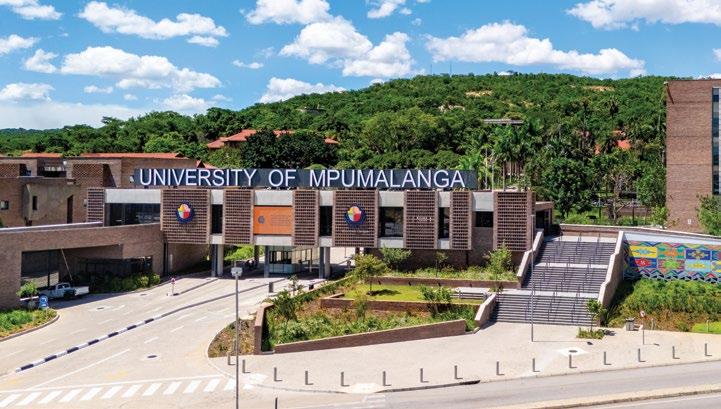

students, equipping them with the skills to pitch to potential funders. Entrepreneurship is available as an academic module, and from January 2025, UMP will introduce a Diploma in Entrepreneurship.
How is UMP positioning itself to contribute to regional development in Mpumalanga and beyond?
UMP values partnerships, collaboration, linkages, and networks, recognising them as both drivers and enablers in achieving our vision, which reads: “To be an African University leading in creating opportunities for sustainable development through innovation.” The needs of the region and beyond were central to developing this vision. Through its academic programmes, research, innovation, and engagement projects, the University positions itself to contribute to local, national, and international development.
UMP’s relevance stems from its deep understanding of regional needs and meaningful community engagement – not superficial involvement. Genuine participation and addressing the real needs of people are fundamental to our approach.


TIMELINE
Born in Mcobotini, Lusikisiki, Eastern Cape
• Grew up in a “mini-forested” homestead named Caledonia
• Parents: both educators; father was a high school principal
• Inspired early by family legacy of education
• Attended school at age 4
University of Fort Hare
• BA in Geography & Psychology
• BA Honours in Psychology
• Master’s in Psychology
PhD cum laude – Freie Universität Berlin
• Registered clinical psychologist
• Recognised researcher and postgraduate supervisor
Academic Career
• Senior Lecturer – University of Transkei (now WSU)
• Professor & Head of School – Wits University
• Executive Dean – Deputy Vice-Chancellor – Nelson Mandela University 1950s/60s
Appointed Founding Vice-Chancellor, University of Mpumalanga
• Arrives in Mbombela in October 2014
• Tasked with building a university on a 9-hole golf course
• Describes it as her toughest assignment yet
Builds UMP from the Ground Up
• Project-manages UMP's growth, structure, systems, and spirit
• Transforms scattered campuses into a thriving institution
• UMP becomes one of only two universities established post-apartheid
Celebrated as a "Universe Builder"
• Recognised in Daily Maverick (May 2024)
• Honoured for “turning a golf course into a university”
• A true builder of institutions, opportunity, and legacy
Honoured with Enactus South Africa Champion Award
• Only the fifth person in history to receive this prestigious honour
• Recognised for exceptional leadership and long-term support of student innovation
• UMP students consistently excel at national competitions under her guidance
31 October 2025
Stepping Down as Vice-Chancellor
• Concludes 11 transformative years as founding VC
• Leaves behind a powerful legacy of hope, education, and empowerment
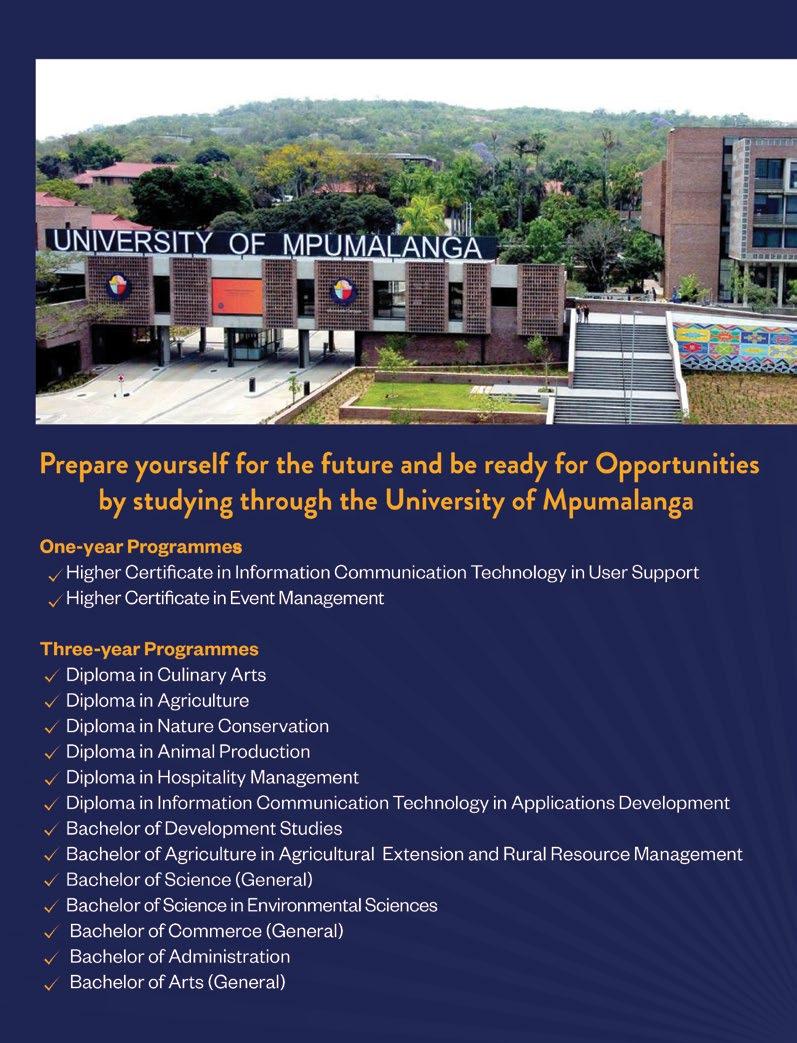
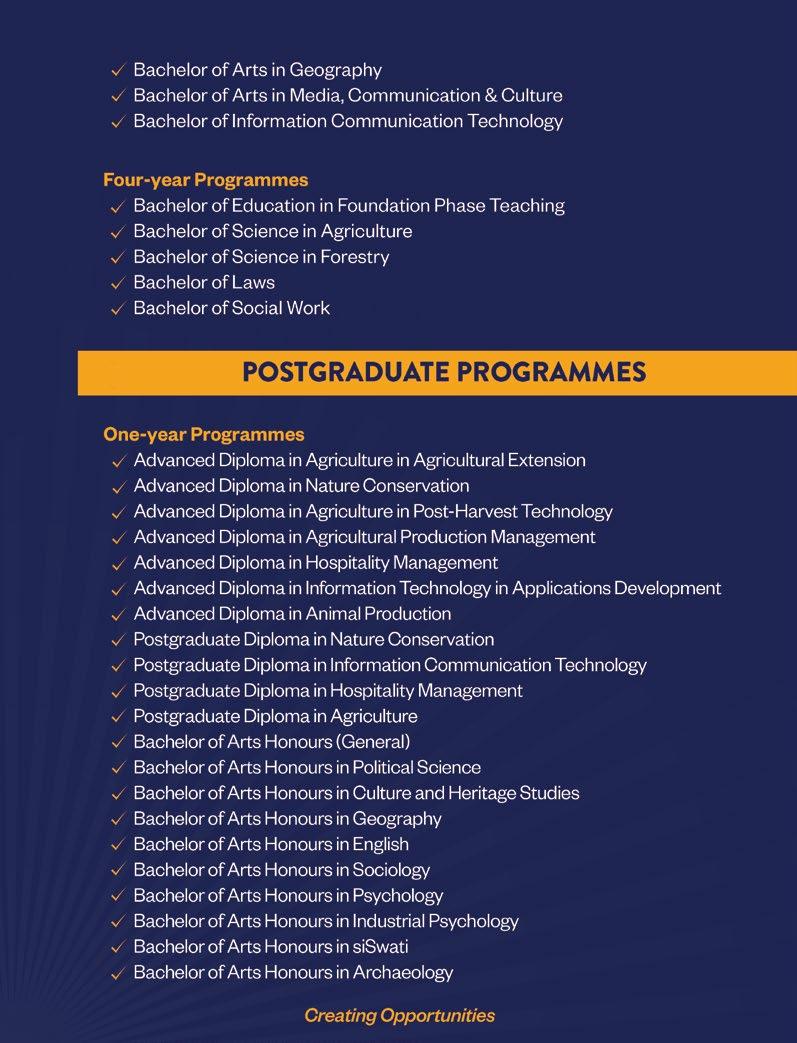


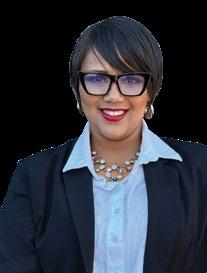


The G20 Summit has placed inclusive growth, sustainability, and economic resilience at the centre of global discourse. These priorities mirror the work already underway in South Africa – where leaders across sectors are driving long-term change. With the final quarter of the year underway, the focus now shifts from intention to delivery.
Azola Mayekiso, CEO of the National Housing Finance Corporation, is doing just that: she is steering the NHFC towards becoming a financially sustainable, high-impact institution. Her work centres on expanding access to affordable, quality housing especially for communities excluded from the formal housing market.
In higher education, Professor Refilwe PhaswanaMafuya, Deputy Vice-Chancellor at the University of Johannesburg, continues to lead in research, innovation, and institutional transformation. Professor Thoko Mayekiso, founding Vice-Chancellor of the University of Mpumalanga, has built a recognised institution focused on regional impact and student empowerment. Her recent Enactus SA Champion award reflects her national influence.
In the private sector, Denise Sonny leads Denise Sonny International, a global executive search firm working with Fortune 500 companies to embed diverse leadership talent that deliver measurable results.
These leaders show that global goals gain meaning only when realised through local action (and local gains) –grounded in institutions that work and leadership that delivers.








South Africans face complex financial choices. CERTIFIED FINANCIAL PLANNER® (CFP®) professionals, FINANCIAL SERVICES ADVISOR® (FSA®) professionals, and REGISTERED FINANCIAL PRACTITIONER®(RFP®) professionals are trusted to guide individuals and families towards lasting financial well-being.
The FPI Trust provides bursaries, scholarships and support to aspiring professionals, ensuring they can complete their studies and enter the profession. Your contribution directly builds the next generation of ethical, qualified financial planners and advisors.
















Nsizwa Mhlanga COVER IMAGE
IMAGE CREDITS: 123rf.com


DISTRIBUTION


Media Support | On the Dot
PUBLISHED BY

6 Carlton Crescent, Parklands, 7441
Tel: 021 424 3625 Fax: 086 544 5217
E-mail: info@sabusinessintegrator.co.za Website: www.mediaxpose.co.za
Disclaimer: The views expressed in this publication are not necessarily those of the publisher or its agents. While every effort has been made to ensure the accuracy of the information published, the publisher does not accept responsibility for any error or omission contained herein. Consequently, no person connected with the publication of this journal will be liable for any loss or damage sustained by any reader as a result of action following statements or opinions expressed herein. The publisher will give consideration to all material submitted, but does not take responsibility for damage or its safe return.
PUBLISHER
Elroy van Heerden-Mays elroy@mediaxpose.co.za
EDITOR
Tarryn-Leigh Solomons editor@sabusinessintegrator.co.za
SUB-EDITOR
Sameena Amien sub@mediaxpose.co.za
CONTENT MANAGER
Wadoeda Adams artwork@mediaxpose.co.za
DESIGNERS
Anja Bramley | Shaun van Heerden-Mays | Tia Arendse
EDITORIAL CONTRIBUTORS
Frank Leonette
Anton Visser
ADVERTISING SALES MANAGER
Rashieda Wyngaardt rashieda@sabusinessintegrator.co.za
ADVERTISING SALES
Reginald Motsoahae reginald@sabusinessintegrator.co.za
Luyanda Mbopa luyanda@sabusinessintegrator.co.za
MEDIA PARTNERSHIPS | EDITORIAL ASSISTANT
Maurisha Niewenhuys maurisha@mediaxpose.co.za
DIGITAL AND SOCIAL MEDIA
Juhi Rampersad | Kyla van Heerden
WEB DEVELOPER
Richard van Staden
DISTRIBUTION & SUBSCRIPTIONS
Shihaam Gyer distribution@mediaxpose.co.za
CHIEF FINANCIAL OFFICER
Shaun van Heerden-Mays shaun@mediaxpose.co.za
RECEPTIONIST
Jacqueline Kemp receptionist@mediaxpose.co.za

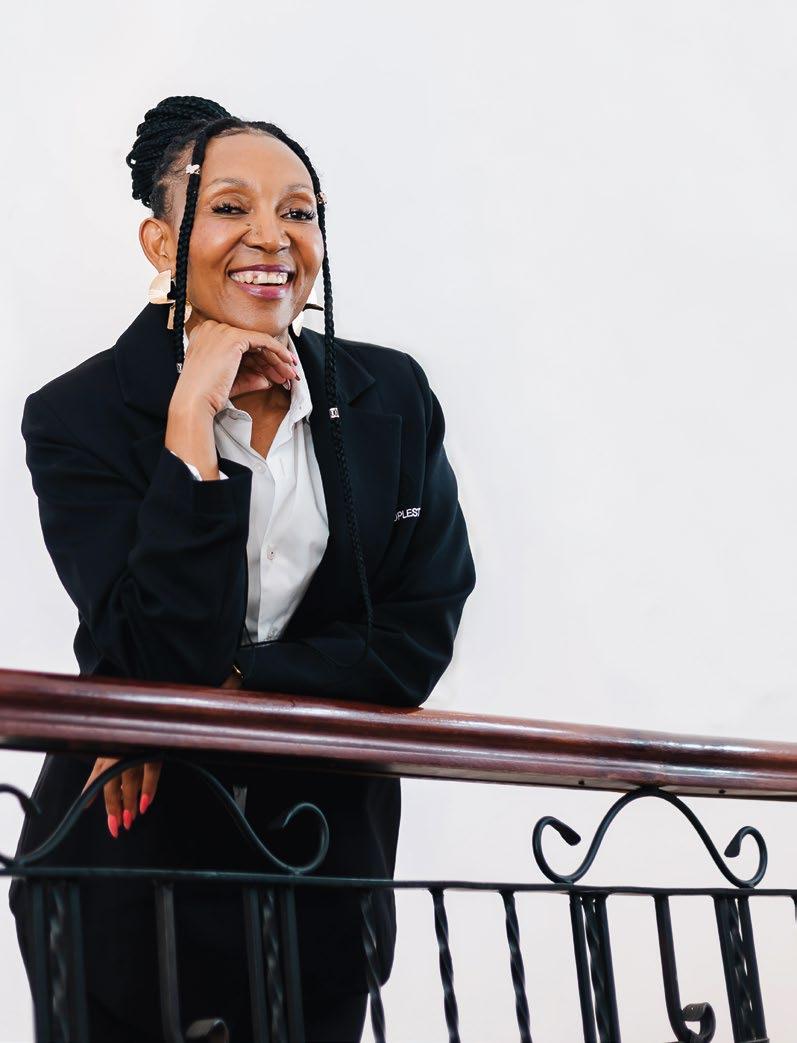
As the G20 Summit approaches, Mashudu Tinyiko Consulting is elevating African voices on the global stage, navigating diplomatic complexities, and redefining the role of South African consultancies in international arenas. We caught up with CEO Nonhlanhla Nkadimeng to talk the power of purpose-driven leadership, strategic partnerships, and an unshakable belief in the potential of our continent.
NONHLANHLA NKADIMENG | CEO
Your consultancy has found itself at the intersection of global diplomacy and local insight. What do you think earned Mashudu Tinyiko Consulting a seat at the G20 table?
Our seat at the G20 table is a recognition of the transformative model we’ve built – one that successfully bridges global policy with on-the-ground reality. I’ve always believed that true value creation happens at this critical intersection. We’ve earned our credibility through a deeply human, community-rooted methodology. This is the very foundation of our “glocalisation” strategy.
Our pivotal role as an advisory partner for the Township Economic Commission South Africa (TECSA) and our engagement with the Sovereign Congress of African Leaders (SCAL) have been crucial. By helping to professionalise black businesses and elevate indigenous leadership, we have demonstrated a unique, proven capability to deliver sustainable and inclusive development.
My appointment as a task force member for the B20, the official G20 dialogue forum with the global business community, is a direct validation of this model. It shows that global power players and governments, including G20 nations, no longer just want to hear from the traditional consulting giants. They are actively seeking partners who can offer genuine, on-the-ground insights and a proven track record of creating value where it matters most. My firm offers that vital bridge, combining our expertise in forensic and financial audits, project management, and supply chain optimisation with an intimate understanding of African economies.
The G20 Summit operates at a high level of diplomacy and global policy. How do you translate its outcomes into tangible value for businesses and communities?
We take the blueprints from these global summits and transform them into tangible, actionable projects that drive real economic inclusion. My firm acts as a vital conduit, ensuring the resources and opportunities discussed in diplomatic corridors directly benefit African businesses and communities.
A key example is Mashudu Tinyiko’s active role in the review of South Africa’s Township Master Plan for the Township Economic Commission South Africa (TECSA). My team and I are providing critical advisory and
consulting services to ensure that this plan is not just a document on a shelf, but a living strategy that can be adopted by governments for the benefits of transforming and developing our township and rural economies and its MSMEs. We help align government policies with the Township Economic Development Act (TEDA), focusing on creating an enabling environment for enterprises in townships and rural areas.
This involves providing services like:
• Supply chain integration: We help major corporations, including multinational enterprises, meet their mandated procurement requirements by seamlessly integrating township and village-based businesses into their value chains.
• Financial and project management: We provide rigorous financial oversight and forensic audits for community-based projects, ensuring transparency and accountability for investors, funders, and government bodies. This builds a foundation of trust that is essential for long-term sustainability.
• Capacity building: We deliver strategic support and training to help MSMEs overcome systemic barriers such as limited access to capital and skills gaps. We don't just provide solutions; we embed capability within the community itself, ensuring that the impact endures long after our engagement is complete.
This is how we turn the promise of G20 dialogues into a powerful reality for our communities.
Our seat at the G20 table is a recognition of the transformative model we’ve built – one that successfully bridges global policy with on-the-ground reality.”
In navigating these global spaces, what have you found to be South Africa’s most underleveraged strength?
In my 25 years in the ‘engine room’ of the economy, I have found that our most profound and consistently under-leveraged strength is our indigenous leadership. Our traditional monarchs and leaders are often seen as ceremonial, but I believe they are our most powerful asset for social and economic transformation.
Through my work with the Sovereign Congress of African Leaders (SCAL) and in conceptualising the Royal 20 Strategic Framework, I am working to formalise this belief. Traditional leaders are not just custodians of land and culture; they are the most trusted figures in their communities. They possess a grassroots legitimacy that formal institutions often lack.
The Royal 20 is a 20-year programme designed to empower these leaders, transforming their role from symbolic to strategic. The framework includes a curriculum for the Royal 20 Academy that will train monarchs in:
• Financial and project management: providing them with the skills to oversee capital expenditures and ensure financial compliance.
• International diplomacy and protocol: equipping them to effectively represent their communities on the global stage, engaging with G20 embassies and international organisations.
• Modern governance: teaching them how to integrate their traditional leadership roles with modern administrative structures to mitigate conflict and ensure ethical leadership.
This initiative is a tangible demonstration that aligning economic development with traditional leadership creates a more inclusive and prosperous future, proving to the world that we don't need to abandon our culture to achieve economic progress.
In my 25 years in the ’engine room’ of the economy, I have found that our most profound and consistently under-leveraged strength is our indigenous leadership.”
What internal shifts did you have to make to go from national relevance to global credibility? It was less about a single change and more about a fundamental evolution of our firm’s DNA. We moved from simply being a provider of high-quality consulting services to becoming a trusted partner in transformation. My team and I are constantly innovating and positioning ourselves at the forefront of the industry. This requires a
proactive, forward-looking mindset. First, we committed to delivering value that outlasts the consulting period. We embed resilience and foresight into every client’s operations. Second, we embraced a “quadruple bottom line” philosophy – focusing not just on profit, but equally on people, the planet, and a sense of purpose. This is a core value that resonates with global clients who are increasingly focused on ESG (Environmental, Social, and Governance) factors.
We are also investing heavily in technology to stay ahead of the curve. My team is currently developing AfriThrive, a digital platform that will empower African businesses, starting with TECSA beneficiaries, to showcase and sell their products on a global scale. This is a structural shift that will directly connect our local initiatives with international markets, providing a powerful gateway for African entrepreneurs.
Our recent nomination as a finalist for the 2025 Nedbank Top Empowerment Awards serves as external validation of these strategic shifts. It’s a testament to the fact that our model is not just effective but is also being recognised for its profound and lasting impact.
Representing a black, female-led consultancy at the G20 is powerful. How do you navigate that symbolism while delivering substance? Symbolism matters, but only when matched with substance. I come from a community shaped by sacrifice, and I lead with a collaborative, empathetic style focused on real transformation.
I’m supported by a strong leadership team – Mark Sithole (COO) and Mbekezeli Moyo (Associate Director of Business Development) – and a dedicated team at Mashudu Tinyiko Consulting. Everyone plays a vital role in delivering our mission.
My leadership is guided by the belief that “women multiply everything they’re given.” I empower my team with real responsibility, operate on a profit-sharing model, and foster a culture of ownership. This drives performance, loyalty, and agility.
We don’t just speak about empowerment – we build it into our model. That’s what makes our consultancy effective, and why our clients see lasting, meaningful results.
Many South African firms shy away from international engagements due to scale or perceived limitations. What are the mental and structural shifts needed to break that ceiling?
The biggest barrier is mindset – a narrow, survival-focused view. We need to shift to thinking in terms of legacy and global competitiveness. At Mashudu Tinyiko Consulting, we see our market not just as South Africa, but the entire continent and beyond.
This requires a Pan-African network and collaborative leadership. My work with the Sovereign Congress of African Leaders (SCAL) reinforced that true economic freedom in Africa comes through unity and partnership. Our firm is ready to serve as a trusted local partner for G20 governments, embassies, and global institutions looking to invest in Africa. We offer both local insight and international credibility to ensure meaningful, grounded outcomes.
“My firm acts as a vital conduit, ensuring the resources and opportunities discussed in diplomatic corridors directly benefit African businesses and communities.”
We’re backing this with action – investing in technology and strategic alliances. Our upcoming AfriThrive app will connect African entrepreneurs to global markets, removing traditional barriers to entry. We’re not waiting for access – we’re building it.
With global attention on the G20, what is the one message or insight about Africa that you are determined to push into the room?
It is this: Africa is not a region in need of aid, but a partner in innovation, resilience, and reform. For too long, the narrative of Africa has been framed through a lens of deficit, disaster, and dependency. We must rewrite this story.
Our continent is home to vibrant economies, a dynamic youth population, and a wealth of indigenous wisdom. As I often say in my public addresses, "The talent is here. The ambition is here. The leadership–the power–is right here in this room." Our challenge is to ensure that global policymakers and business leaders see this potential and move from policy talk to actionable, strategic partnerships. We are ready to be co-authors of global economic policy. We are ready to be leaders in the new, inclusive, and sustainable global economy. The time for being policy-takers is over; we must now become policy-shapers.
When the summit is over and the cameras are off, what legacy do you hope Mashudu Tinyiko Consulting will leave in this space – both locally and globally?
When the cameras are off and the summit concludes, I want Mashudu Tinyiko Consulting to be remembered
for a legacy of trust, transformation, and excellence. I want us to be known not just for the projects we have completed, but for the lasting positive impact we have had on our clients, our communities, and our continent.
For our partners, TECSA and SCAL, I hope our legacy will be that of a unified, ethical, and inclusive African economy. My vision for the next decade is to continue growing our firm’s influence and expanding our services, particularly in areas of sustainability and technological integration. My ultimate goal is to see the consulting industry become a powerful force for social and economic progress across the continent. With our AfriThrive app, the expansion of the Mashudu Tinyiko Group into mining, pharmaceuticals, and property, and our ongoing commitment to mentorship, we are not just building a business; we are building a legacy that is ethical, inclusive, and unapologetically African.
www.mashudutinyiko.co.za

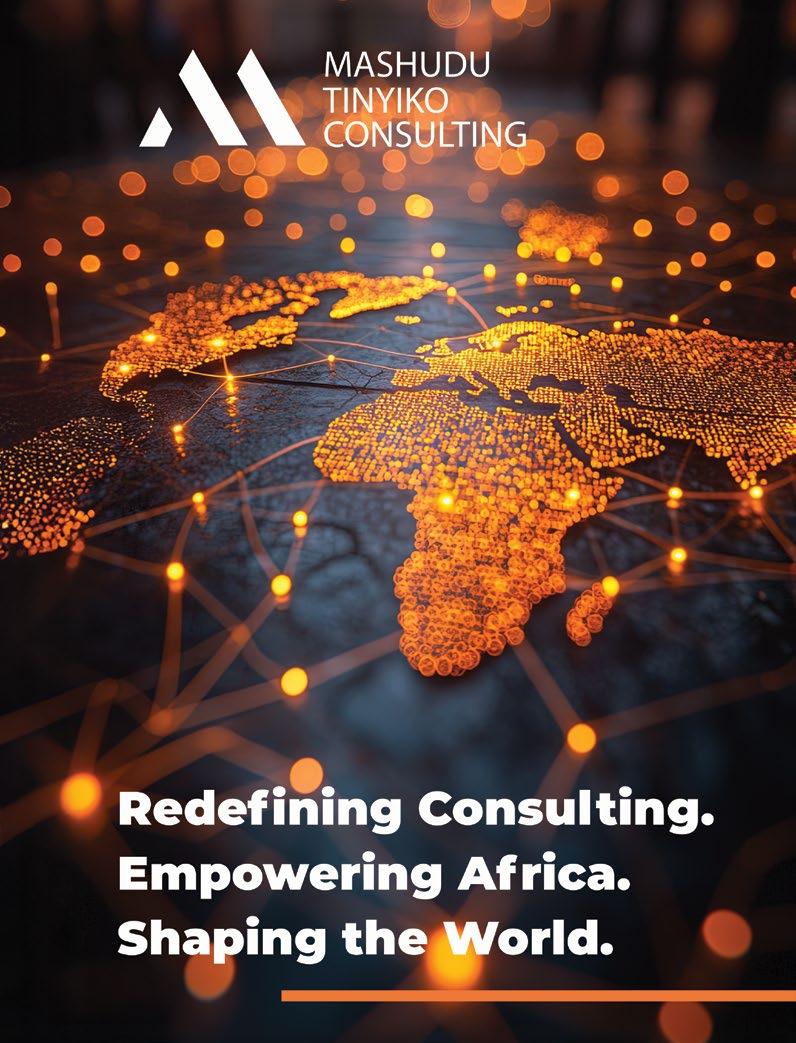
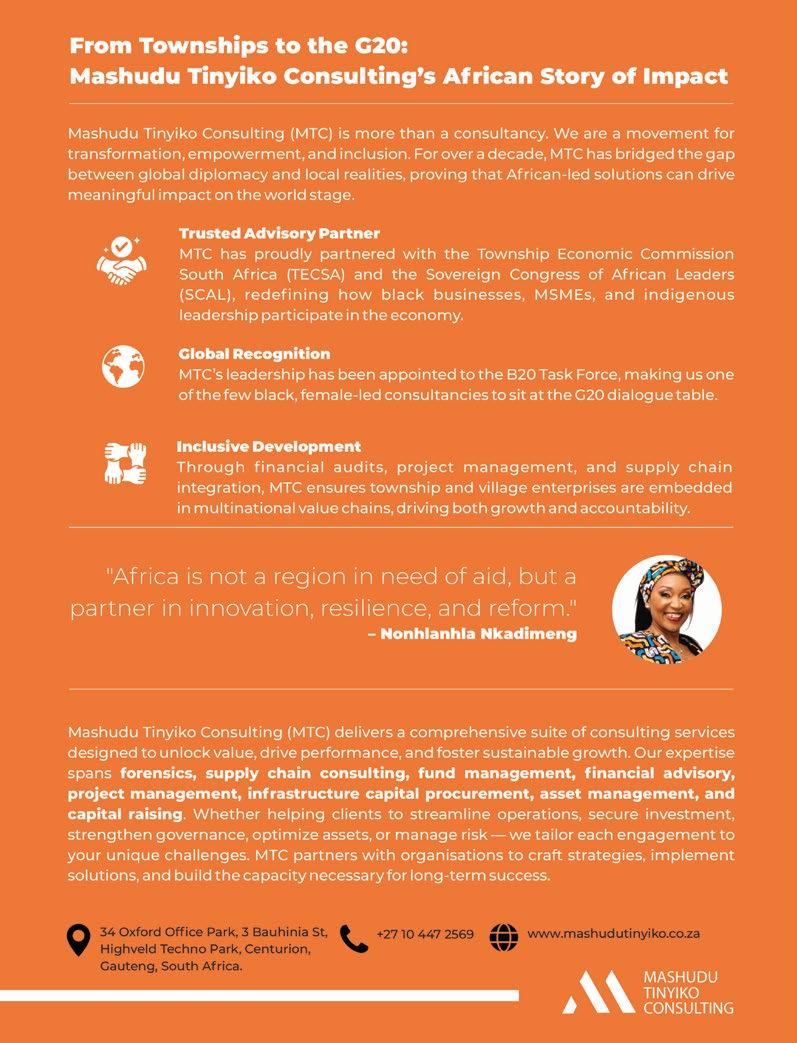
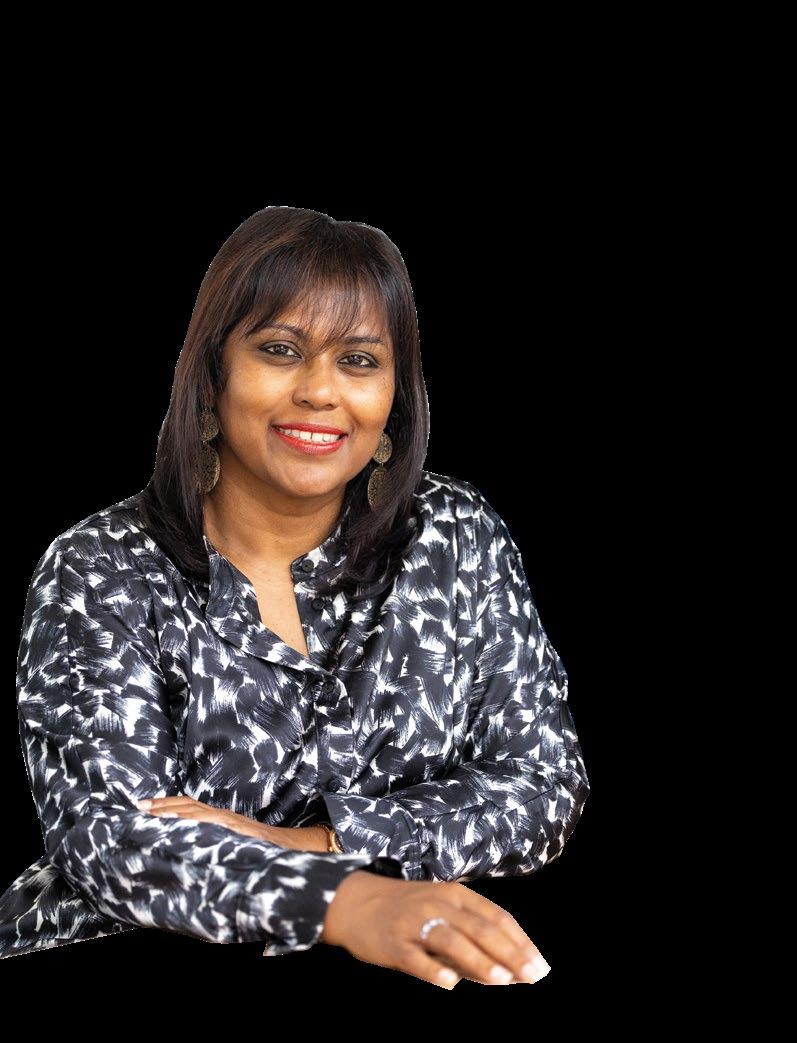
Denise Sonny, a graduate in Industrial Psychology and Communications and alumna of the Oxford Executive Leadership Programme, began her career in education before driving transformation and diversity in South Africa’s banking sector. She now leads Denise Sonny International, a global executive search firm partnering with Fortune 500 companies to secure and integrate top leadership talent that delivers measurable business impact.
Your career spans education, finance and global consulting, what prompted your transition from academia to advising C-suite leaders at Fortune 500 companies?
My move from academia to advising C-suite leaders was fuelled by a hunger to test myself beyond the classroom. Teaching gave me discipline and the skill to simplify complex ideas, but I wanted to be closer to business impact. At ABSA, I gained financial and product knowledge while discovering the power of relationship sales. Being headhunted into executive search was the turning point, connecting my passion for people and leadership with senior decision-makers worldwide. Each transition built resilience and agility, ultimately shaping Denise Sonny International into a trusted global brand. At heart, my journey has always been about people, business, and learning.
How do your qualifications in industrial psychology and communications inform the way you design leadership and talent strategies on a global scale?
My background in industrial psychology and communications gives me a unique lens in shaping leadership and talent strategies. Psychology taught me to understand what truly motivates people and how leaders can unlock performance, while communications showed me the power of storytelling to align teams around a shared purpose. On a global stage, where leaders face pressure to deliver results and navigate social expectations, I draw on both disciplines to design strategies that are practical, human, and inspiring. This blend helps executives lead with resilience, build trust, and create impact that goes beyond shareholder value.
Having served on transformation and diversity boards within South Africa’s top financial institutions, what structural challenges in leadership pipelines do you believe still remain?
One of the biggest structural challenges I see, both in South Africa and globally, is an ageing leadership pipeline. While organisations have multigenerational workforces, many millennials and Gen Z professionals are not aspiring to leadership. Technology and social media have shaped different ways of thinking, and many younger employees view leadership as unattractive. This creates a gap where succession planning becomes increasingly fragile. Another challenge lies in how leaders build networks. Too often, individuals invest heavily in personal networks but hesitate to develop the strategic and operational connections that
are critical for organisational growth. Limited leadership aspirations among younger generations and weak strategic networks are structural barriers that keep leadership pipelines from being future-ready. To overcome this, organisations must rethink how they position leadership as purposeful and impactful while also creating environments that foster collaboration and shared learning across generations.
In a field crowded with executive search firms, how do you differentiate true value from influence when attracting high-potential leaders?
What sets true value apart from influence is the human connection. I've learned that high-potential leaders are not simply attracted to big-name brands, they respond to understanding, insight, and authenticity. They challenge the status quo, which is why I focus on uncovering what matters to them, speaking their language, and building relationships that extend beyond transactions. I engage with leaders who successfully navigate the authenticity–adaptability paradox, exploring their values, purpose, structures, and identity. In today's post-pandemic era, trust and genuine engagement have become even more essential. For me, influence arises organically when deep insight is paired with authentic connection, demonstrating to leaders that I am committed to their growth, not just to placing them in a role.
What is the most underestimated capability
C-suite executives need to cultivate to remain effective in today’s complex business environment?
From my experience working with executives globally, the most underestimated capability is simply the ability to care. Many leaders think showing genuine concern is a weakness, but I have seen firsthand how it transforms teams and cultures. Leaders who take the time to listen, understand, and support their people build trust and foster collaboration, even in high-pressure, complex environments. Caring creates resilience, engagement, and a sense of belonging that drives real results. For me, integrating care into leadership isn’t optional, it’s a strategic tool that turns human connection into a catalyst for meaningful change.

www.denisesonny.com
True gender equality at work needs more than just policies – it needs men to step up. In South Africa’s shifting workplace, male allies have the power to turn progress into permanence through everyday actions that uplift, include and drive lasting change.
When men are deliberately engaged in gender inclusion efforts, 96% of organisations report progress. Without them? The number plummets to 30%. “That’s not just a statistic – it’s a wake-up call,” says Dr Neil Sirbadhoo, MD of the LDM Consulting division in the built environment. “In South Africa, where women hold nearly half of senior leadership roles, we’ve proven progress is possible,” he continues. “The real question is whether we're willing to do the sustained work to keep it going. And that work increasingly depends on male allyship.”
South Africa presents an interesting contradiction. We are a global leader when it comes to female representation in senior roles – 47.2% in 2025, compared to a global average of 34%. Women dominate HR and
finance leadership, with nearly one in three CEOs female – progress in gender parity in the boardroom that’s the envy of many countries.
But this progress exists alongside deeply rooted challenges, because despite this strong representation, women here still face constant workplace challenges. They’re interrupted in meetings, overlooked for highprofile assignments, spoken over, or mistaken for junior staff. South Africa’s 32.9% unemployment rate and ongoing pay gaps also add extra pressure on progress that could easily be lost. “Unfortunately, when economic pressure rises, transformation strategies can stall,” observes Dr Sirbadhoo. “And this is where male allies can help to ensure they don’t.”

Many men genuinely believe they’re already champions of gender equity, yet women often don’t experience that support turning into meaningful action. This perception is one of the biggest barriers to progress. But when men do engage authentically – when they speak up, actively listen, and advocate for change, their voices carry weight.
“Allyship isn’t about speaking for others,” Dr Sirbadhoo explains. “It’s about amplifying voices that are already there, but not being heard.”

He points out that in a country such as South Africa, with its deep social divides, allyship must also recognise that women don’t all face the same barriers – race, background, and access matter, too. Supporting women means navigating these biases, particularly in industries where leadership roles are traditionally male-dominated, such as the built environment sector.
So, what are the benefits of allyship to a company?
According to McKinsey & Company, organisations that engage men in gender equity efforts don’t just see better representation, they see better results. Inclusive cultures improve innovation, decision-making, and employee engagement. In South Africa’s competitive economy, this isn’t a “nice-to-have” – it’s a strategic imperative.
And how does it benefit men? Allyship builds stronger teams, deeper trust, and more authentic leadership. It’s not about guilt, it’s about growth, says Dr Sirbadhoo.
“Allyship cannot be about good intentions, and that’s something we feel very strongly about at LDM. It’s about showing up in practical ways,” he adds. “That means speaking up when inappropriate remarks are made, even when it’s uncomfortable. It means using your position to open doors for women, especially when it comes to promotions or high-impact projects. It’s about making sure women’s contributions are heard and acknowledged in meetings, and being willing to
challenge bias wherever it shows up, whether in hiring, performance reviews, or everyday interactions.”
To turn good intentions into lasting impact, companies must embed allyship through consistent DEI (Diversity, Equity, and Inclusion) practices such as:
• Offering structured allyship training that goes beyond compliance to build real skills.
• Recognising and rewarding inclusive leadership behaviours.
• Holding leaders accountable for gender equity outcomes, not just business metrics.
South Africa stands at a unique crossroads. We’ve achieved remarkable progress in gender representation, but sustaining that progress requires a new level of commitment. The potential for true gender equity is real and rising, but it won't happen automatically.
“Allyship isn’t about being perfect,” Dr Sirbadhoo concludes. “It’s about being present. Listening. Learning. Using your voice to open doors for women.”
And in a country where the stakes are this high and the potential this great, the role of male allies has never been more critical – or more powerful.
Sayf is the new safety app offering real-time location tracking, instant emergency alerts, and direct communication with help. Built for families and individuals, it puts personal safety and reassurance in the palm of your hand.
Tracker, a leader in innovative vehicle tracking solutions, has expanded its product offering with the launch of Sayf – a new mobile app designed to enhance personal safety and family visibility.
Built on Tracker’s strong foundation in location-based technology, Sayf delivers real-time location tracking, instant emergency alerts, and direct communication with emergency services. The app offers peace of mind to families by enabling users to monitor the whereabouts of loved ones and respond quickly in critical situations.
Sayf reinforces Tracker’s ongoing commitment to innovation following the successful release of its business optimisation and supply chain visibility platform, OKgo, in October last year.
“Tracker is a trusted brand in South Africa, with an existing strong reputation for caring for families and keeping them safe. The company is widely recognised for its dependability and commitment to customer service,” explains Tracker CEO, Dillan Fernando. “We’re now taking this one step further with Sayf.”
Through its own insights and the company’s core working relationship with the security industry, Tracker is aware that crime and safety are top of mind concerns for many citizens. That is the motivation behind introducing a service that offers users the reassurance of always knowing their loved ones are safe.
The app gives families 24/7 visibility of their loved ones, along with risk alerts and real-time connection with SOS services such as medical and armed response. This means the app not only tracks and provides insights into where family members are, but also allows real-time
alerts when they are entering risky situations, such as areas of unrest or potential hijacking. Additionally, it is able to send instant alerts to emergency services and coordinate communication with responders during an emergency event.
The app’s features include:
Live location tracking and sharing: allows users to know where their loved ones are at any time.
Real-time location notifications: notifies when loved ones leave and arrive safely.
Behaviour and movement monitoring: so potential risks are identified before they arise.
Proactive alerts: to ensure users know when their loved ones are at risk, even if they are not checking their phone.
An SOS button: sends alerts to armed response or medical support to send immediate help.
“The reality in today’s world is that we all face risks and danger. We know that nothing concerns our customers as much as the wellbeing of their family and loved ones, and the worry that they may be at risk. We have launched this app as a way of giving our customers the reassurance that there are ways to pre-empt and prevent risks and protect their families, because we know that nothing matters more to them,” says Shaun Kirk, Managing Executive of Sayf.
The app is available for download on the Google Play and Apple stores. Further information can be found on www.sayf.co.za.






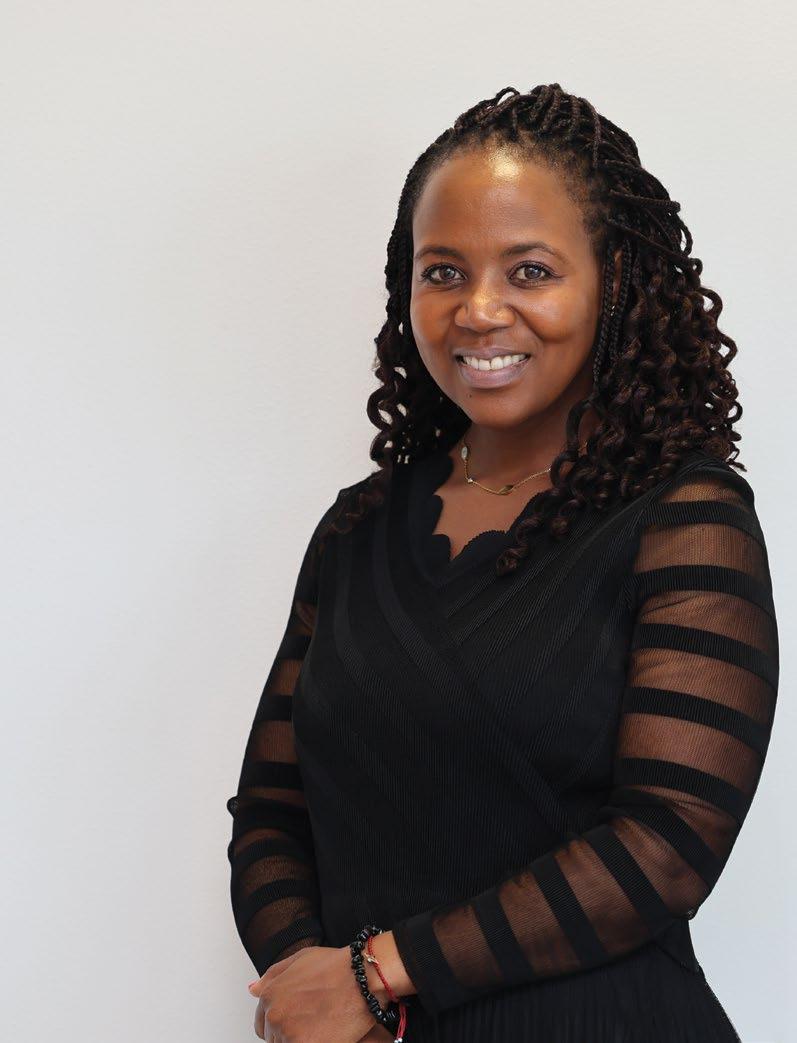
National Housing Finance Corporation (NHFC) CEO Azola Mayekiso’s mission is to grow the organisation into a sustainable, high-impact entity to ensure equitable access to affordable, quality housing – especially for marginalised communities.
You stepped into the CEO role at a pivotal time. What are your non-negotiables in shaping the NHFC’s new chapter?
First, a high-performance culture internally, one that is designed to transform the NHFC into a responsive apex institution in the human settlements sector. Secondly, the NHFC is taking an interventionist role in the sector to ensure that there’s a credible pipeline of mega human settlements projects to begin addressing the low-cost and affordable housing backlog in earnest. We also want to be more responsive to our target market and are engaged in injecting efficiencies into our processes and procedures so we can assess and approve transactions a lot faster. We’ve also assessed and refined our own strategies to navigate market failures. To address the equity gap, specifically for emerging developers, we've reviewed our equity and quasi-equity instruments to make them more responsive in providing the necessary support. At the same time we are capacitating emerging developers to ensure there are competent developers to help address the housing backlog challenge. In summary, the following are my non-negotiables:
• People-centred approach: Every decision must prioritise the needs of South Africans, particularly low-income earners, women-led households, and the youth.
• Financial sustainability: Balancing social impact with fiscal responsibility to ensure NHFC’s long-term financial sustainability
• Transparency and governance: Zero tolerance for corruption, with robust systems to ensure ethical leadership
• Innovation: Leveraging technology and partnerships to streamline housing delivery and financing
What does transformation in the housing sector mean to you – beyond ownership stats and enterprise development targets?
It means capacitating the sector with technical support so we can ensure a pipeline of competent developers who will deliver a good quality product with no comebacks in terms of workmanship – a longstanding challenge in the fully subsidised housing segment. It means, too, a value-chain play for us whereby we democratise access for building material manufacturers who have not, to date, played a mainstream role in the built environment. Finding solutions to address blockages that have until now impeded catalytic delivery of low-cost and affordable housing is likewise a huge
priority. In summary, transformation isn’t just about numbers, it’s about dismantling systemic barriers. For me, it further requires:
• Financial inclusion: Expanding access to housing finance for informal workers and underserved groups
• Gender equity: Ensuring women aren’t just beneficiaries, but active participants in housing delivery and ownership
• Community-led development: Partnering with grassroots organisations to co-create housing solutions that take into account local realities
We’re doing everything we can within our ambit, and for the rest, we’re playing an advocacy role in the hope that our submissions will find favour with policymakers in the fullness of time.”
Leadership in a public institution often comes with constraints. Where have you found room to innovate within the red tape?
We have intensified our ability to be interventionist in the ways we tackle the housing challenge. Over the past year, we’ve focused on introducing efficiencies into our operations and our lending and investment processes. We’ve also reviewed our risk appetite statement and policies. We’re doing all of this with a view to being more responsive to our target market while staying true to label as a Development Finance Institution (DFI).
To broaden our reach, we have also locked in strategic partnerships with the private sector to deliver widely for the First Home Finance programme, where we are a national implementing agent on behalf of the Department of Human Settlements. We’ve further implemented fintech tools to simplify loan applications and approvals for low-income applicants within this programme.
We’re doing everything we can within our ambit, and for the rest of it, we’re playing an advocacy role in the hope that our submissions will find favour with policymakers in the fullness of time.
How do you define success in a role where impact is both social and financial – and often long-term?
As a DFI, we define success through our ability to fund developers who come to us as a last resort and we're still able to fund them; they successfully deliver on projects, pay us back our money, and we can then pay it forward by funding other developers. Being able to find ways to structure transactions that would otherwise not be funded by commercial banks and still ensure their financial viability as well as see them through to approval, is most gratifying.
Even more important is when our clients are able to fulfil conditions precedent and we can start disbursing funds into projects. Ultimately, our success is measured by housing units and opportunities delivered on the ground. Once we’ve gone through the full cycle, we’re always pleased to see what we’ve contributed on the ground at the end of every financial year.
In summary, we measure success by:
Lives Impacted:
Financial Health:
Policy Influence:
Good quality loan book:
The number of families housed, especially those who’ve migrated out of informal settlements
NHFC’s ability to recycle capital into future projects
Advocating for regulations that enable faster, fairer housing delivery
We are actively working out and turning around legacy exposures to improve the quality of our loan book.
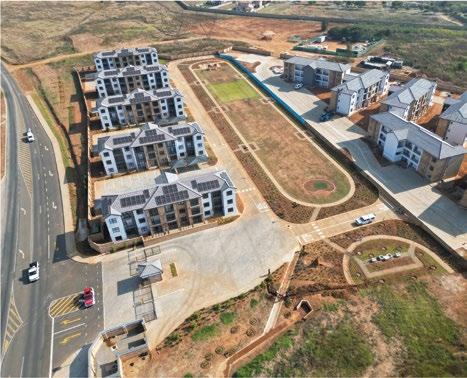
Are there any leadership lessons you’ve had to unlearn since moving into the housing finance space?
The first one is the idea that marginally profitable is good enough where the greater purpose is delivering housing units and opportunities on the ground. The second lesson I’ve had to unlearn is aiming for perfection before executing. I’ve since learnt that it’s okay to fix the aeroplane while it’s in flight. We are fixing as we go and putting the necessary risk mitigants in place so we don’t put the financial sustainability of the organisation at risk.
The NHFC sits between policy and people. How do you ensure strategy stays rooted in the real-world needs of South Africans?
We're at the coalface of delivery because we fund developers whose challenges we are keenly aware of, so all our responses are steeped in the lessons we learn from those developments or from applications we decline. We launched the Emerging Developer Incubation & Post-Investment Support Programme in March 2025 precisely because many emerging developers lack the technical capacity required to deliver good quality projects. Currently, the NHFC is tasked with helping unclog systemic blockages and we are cocreating solutions with other DFIs so mega human settlements delivery can become a reality.

If you could redesign one part of South Africa’s housing system from scratch, what would it be – and why?
Social housing. This is subsidised rental stock that is structurally challenged in terms of the way it works. It’s too costly to deliver, given the capped rentals that landlords are allowed to charge. I would allow for it to be delivered exclusively with alternative building technologies that are proven to save time and costs of delivery. I would do annual indexation of the consolidated capital grant that provides the bulk of the project finance required to build social housing stock. I would equally ensure that households falling outside the bracket of subsidised rental stock are migrated out of social housing once their income levels breach the R22 000 household income level.
As housing needs shift due to urban growth, climate change, and economic pressure, what future do you believe the sector isn’t preparing for fast enough?
Our population is growing at the rate of 1.2% per annum, far outpacing the growth rate of the GDP. Densification needs to be intensified – high rise residential buildings need to become the norm to cater for the rapid
urbanisation that is already a reality. Spatial planning needs to take into account that floods have now become a regular occurrence. Informal Settlement upgrades need to be rolled out more rapidly and end-users must be educated about the devastating effects of being located on flood lines or close to riverbeds. Adaptation of green building methods is something we are not doing enough of as a sector, as well as mainstreaming alternative building technologies that are heat resistant and flood resistant.
Leadership is about courage and compassion. As a Black woman in this role, I carry the hopes of millions. NHFC’s success won’t just be in the balance sheets. It has to be in the faces of families who finally have a place to call ‘home’.
www.nhfc.co.za
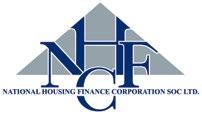
A SARS Letter of Demand is your final warning before enforcement – like salary garnishment or frozen bank accounts. Don’t ignore it. Act fast, check your eFiling, and either pay, dispute, or apply for relief. Timing is everything to avoid escalation.
A letter of demand from the taxman is like a financial fire alarm to jolt you into action in order to prevent the heat from turning into flames. But don’t expect any shrill sirens or flashing lights to alert you to the fact that you owe taxes. The SA Revenue Service (SARS) typically uploads the letter of demand on your eFiling profile and – provided you have
updated your contact details – also sends an email or SMS notification. “Unfortunately, many taxpayers only realise they’ve received this when their bank account is already frozen or their salary garnished,” says Razael Manikus, COO at Latita Africa. “At that stage, it’s very serious, but you can still solve the problem by acting immediately.”

It’s a formal notice issued when SARS believes you owe tax. Often this debt is due to incorrect IRP5s or third-party data mismatches; unclaimed deductions incorrectly reflected (such as medical aid or retirement contributions); undisclosed investment or rental income; penalties on late submissions or underpayments from previous years; or reversed refunds after a SARS audit.
SARS often sends reminders before the official Final Letter of Demand, but these reminders are courtesy communications, not legally required steps. SARS can send SMSes, emails, or eFiling notifications reminding you of outstanding balances. These are not legal letters and don’t trigger the 10-business day enforcement countdown. The purpose is to give taxpayers a chance to settle before formal debt collection begins. The final (and only) letter of demand is the first legal step in SARS debt collection. This is issued via eFiling, email, or physical post to your registered address, and starts the 10-business day period before SARS can take enforcement action (e.g. bank account debit, salary garnishment, property attachment).
SARS can, without further warning, deduct money from your income via garnishee orders to your employer or clients. The Revenue Service can also attach your bank funds, withhold tax clearances and refunds, and get a court judgment that will blemish your credit record. In cases of repeat non-compliance, SARS can even refer you to the National Prosecuting Authority (NPA).
Log into your SARS eFiling profile to check the date the letter of demand was issued (under “Correspondence”). That’s the start of your 10-business-day response window. Review your statement of account to identify the source of your debt and the tax period involved. If the amount is correct and you’re able to pay, do this immediately. Use the payment reference number on the letter to pay SARS.
Apply for a suspension of payment if you can’t pay or need breathing space before disputing the amount. This legal mechanism doesn’t cancel the debt but pauses SARS’s ability to collect. You can apply for a suspension of payment via eFiling or your tax representative. Attach a statement of financial hardship and your latest bank statements, or a note explaining your intention to dispute.

If you accept your debt but can’t pay in full, SARS may agree to a deferred payment plan with instalments. Or you could negotiate a compromise of tax debt, where SARS reduces your debt if the full payment would cause you financial hardship.
If you believe the assessment is wrong, lodge a formal notice of objection on eFiling. You have 30 business days from the original assessment. Clearly explain the reason for your objection, and attach supporting documentation (such as invoices, proof of payments, or bank statements).
“SARS aren’t trying to trick you,” says Manikus. “They only want what’s legally owed to them.” It’s crucial to follow the correct procedures and timelines when receiving a letter of demand. Don’t assume the problem will resolve itself. Instead, speak to a qualified tax expert immediately, she says. Timing is everything.
Malungelo Zilimbola, founder and CEO of Mazi Asset Management (Mazi), reflects on the firm’s journey from a pioneering hedge fund to a leading asset manager.

Mazi has grown from one of SA’s first black-owned hedge fund firms into a major asset manager. What were the pivotal moments that shaped this evolution?
When I founded Mazi Asset Management, I had already gained valuable experience at two worldclass asset managers, Investec Asset Management (Ninety One) and RMB Asset Management. I was motivated by a need to demonstrate that black professionals could not only manage funds successfully, but that they could also build institutions of scale and excellence. A defining moment was our decision to transition from a niche hedge fund player to becoming a fully-fledged asset manager, offering clients a broad range of capabilities across South African, Africa, and global equities; Shariah-compliant funds; fixed interest, multi-asset solutions. Looking ahead to our 20th anniversary in 2026, we are preparing to launch our brand into the retail market with a renewed focus on making investing more inclusive and accessible to everyday South Africans.
You describe Mazi as both innovation-driven and rooted in African heritage. How do you balance tradition with forward-thinking investment strategies?
Tradition provides the stability and consistency that give investors the confidence that their assets are in safe, steady hands. Innovation, on the other hand, ensures we remain relevant and competitive in an increasingly volatile and uncertain world. By integrating both, we create a foundation of trust while continuously evolving our strategies to deliver superior, long-term outcomes.
I was motivated by a need to demonstrate that black professionals could not only manage funds successfully, but that they could also build institutions of scale and excellence.”
How does Mazi’s governance model of independence and employee ownership influence your investment decisions and company culture?
Our culture is built on diversity, teamwork, ownership, and an entrepreneurial mindset. This environment empowers our team to bring forward fresh investment ideas, debate them rigorously, and make swift, informed decisions in the best interests of our clients.
Integrity, resilience, and disciplined research are central to your philosophy. How have these values guided you through volatile or uncertain market cycles?
Integrity is a non-negotiable – it is the foundation of any sustainable business. Equally important is our disciplined research process, which has consistently demonstrated its strength through some of the most challenging global events – from the 2008 financial crisis and Brexit, to the COVID-19 pandemic and Donald Trump’s trade wars. Our ability to navigate these periods successfully is a clear testament to the resilience of our philosophy and the rigour of our discipline.
Mazi manages over R54bn in assets today. What do you think institutional and private clients value most about your approach to wealth creation?
Clients trust us to deliver consistent, risk-adjusted
returns that create real impact. Beyond financial performance, they value the peace of mind that comes with knowing their capital is managed responsibly, with Environmental, Social and Governance (ESG) considerations embedded in our approach.
As a Level 1 B-BBEE firm, what role does transformation and inclusivity play in the broader purpose of Mazi – beyond financial returns?
For us, sustainability extends well beyond financial performance. We are intentional about reducing our environmental footprint, with our Johannesburg offices proudly holding a 4-Star GBCSA Green Star rating. On the social front, we collaborate with organisations such as the National Centre for Child Protection, The Leading Edge Foundation, and Ride4Hope through our partnership with Bazala Cycling – through which we helped establish a computer lab at a school in Standerton, amongst other initiatives.
We are deeply concerned about the high levels of youth unemployment and are committed to addressing this challenge through our MaziGrad graduate programme and job-shadowing initiatives. Our governance framework is anchored by an independent board that ensures accountability and transparency. Most importantly, we believe our people are our greatest asset, and we continue to invest in their growth so they can reach their full potential.
Which opportunities or trends are you most focused on in shaping the next chapter of Mazi’s growth?
We see significant opportunities in the alternative investment space – particularly in infrastructure and private equity, both in South Africa and across the continent. These sectors don’t only offer compelling returns; they also have the potential to drive broader economic growth and meaningful social impact, aligning closely with what we value.
www.mazi-assetmanagement.co.za


While banks stall, young Africans are building their own financial paths by using crypto, mobile wallets, and digital tools that actually work. It’s neither hype nor headlines, just real people solving real problems with tech that fits their lives.
By Frank Leonette, CEO Afridax By Frank Leonette, CEO Afridax
In the bustling marketplaces of Nairobi, Lagos, and Johannesburg, and across countless village economies, a quiet revolution is underway. Blockchain technology and digital assets are leapfrogging traditional banking barriers to deliver essential financial services through a mobile-first mindset. Importantly, this transformation isn’t driven by old institutions, it’s powered by younger generations reshaping how money works in Africa.
One block at a time Africa’s financial inclusion crisis remains real. According to the World Bank, over 50% of Sub-Saharan African adults remain either unbanked or underbanked. Complex account-opening requirements, high transaction fees, and limited geographic infrastructure continue to lock millions out of the formal financial system. However, blockchain-based solutions offer a practical alternative.

Cryptocurrency-based transfers provide instant low-cost alternatives to traditional remittance services. Stablecoins, pegged to global currencies, protect against currency volatility. Microfinance platforms using blockchain deliver transparent community-driven lending, while tokenisation (converting real-world assets (RWAs) into tradable digital tokens) enables entrepreneurs to leverage assets as collateral and secure funding.
Similarly, many African entrepreneurs are embracing tokenisation to issue digital collateral, gain micro-loans, or fractionalise assets. At the same time, decentralised finance (DeFi) products tailored to local needs (such as yieldbased saving pools or communitydriven lending) offer alternatives to
exploitative informal lenders. These innovations are closing financial gaps by responding to challenges, not recreating them.
The digital generation seeks better...
What’s most noteworthy is who is driving this shift: Millennials and Gen Z-ers in Africa are digital natives, and are accelerating crypto adoption more rapidly than any previous generation. These young users grew up with mobile wallets, social payments, and peer-to-peer apps as a norm, not a novelty.
They value control over intermediaries, and blockchain offers just that: self-custody, transparency, and direct account ownership. They’re also less bound by legacy financial friction, making them quick to experiment with digital assets for everything from daily transactions to side-hustle settlements.
While technology is key, accessibility also depends on cultural and linguistic inclusion. For many users, navigating financial products in their mother tongue builds trust and confidence. Recognising this, some African exchanges are now integrating local languages such as Zulu and Swahili as well as foreign languages such as Chinese into their platforms.
This commitment to language inclusion is a critical factor driving adoption. By meeting people where they are, linguistically and culturally, crypto platforms are lowering barriers to entry and creating a more inclusive digital economy.
The dual elements of concrete utility plus youth-driven momentum is why crypto is taking off in Africa in ways unseen elsewhere. But the growth here isn’t blind; it’s emerging around platforms built for the continent – solving real needs in real time.
Consider mobile-first wallets addressing identity gaps with simplified onboarding, or localised stablecoins pegged to Pan-African currencies, providing price stability in volatile markets. Or even regulatory frameworks that are cautiously evolving to encourage compliance without stifling growth, such as sandbox programmes in Kenya or Nigeria.
These are not Silicon Valley pipe dreams; for the younger developer community and crypto-savvy investors in Africa they represent the foundation for financial services that are fit for purpose.
the
What businesses and banks should watch
Traditional financial institutions and regulators must adapt to stay relevant. If youth-led crypto ecosystems continue to thrive outside bank networks, the risks are twofold: financial exclusion and the potential for unregulated, unsafe platforms gaining traction.
ecosystems continue traction. ways.

Banks can instead form partnerships, offering compliance, liquidity, and trust while tapping into digitally native, youth-driven growth. Regulators can establish pathways for safe crypto adoption that uphold financial integrity without stifling innovation. Businesses can integrate tokenbased payments or loyalty programmes, engaging digitally fluent consumers in new and dynamic ways.
Africa’s financial leap is not being driven by traditional incumbents – it’s unfolding in the hands of a younger, digital-first generation tackling realworld challenges through blockchain and digital assets. From remittances to savings, informal lending to youth-led trade, crypto is not fuelling a speculative gold rush; it’s enabling people to manage everyday finance more effectively.
For business leaders, policymakers, and fintech
blockchain’s real-world utility, frame it for the
For business leaders, policymakers, and fintech entrepreneurs, the opportunity is clear: leverage blockchain’s real-world utility, frame it for the continent, and meet a generation that’s already ready to build the future.

Avi Mishan, Co-Founder of Sourcefin, shares how selling calculators from his car shaped his business grit.
AVI MISHAN | CO-FOUNDER

We back SMMEs where others won’t, helping them grow and succeed with funding that actually works for them.”
You started by selling calculators from your car – how did that shape how you build businesses today?
Starting out selling calculators from my car taught me how to hustle and to stay close to the customer. I learned firsthand what it takes to win someone over, one sale at a time, and to deliver real value. A lot of people land in leadership roles because of education or circumstance, but when you’ve built your path from the ground up, you see the business from every angle. You understand the effort needed at the bottom, and that perspective shapes how you lead at the top. It makes you more aware, more grounded, and able to relate to your team because you’ve lived the challenges that they face.
Are there any lessons you’ve learnt from scaling SMD Technologies that have influenced your approach at Sourcefin?
The biggest lesson I have learnt from scaling SMD is the power of compounding. Every day you solve a problem, then you do it again the next day, and the next month, and over time those solutions build on each other. At first, the end goal can feel far away, but with consistency, the business starts to grow exponentially.
The other big factor, and possibly the most important, is having the right people. When everyone is aligned with the vision, goals, and objectives of the business, they naturally put the right systems and processes in place and make the right decisions. That alignment creates the foundation for growth, whether you’re running a product business like SMD, or funding SMMEs through Sourcefin.
What drew you to Sourcefin, and how did you spot the gap in the SMME lending space?
What drew me to Sourcefin was the problem that we’re solving, which is one that I’ve lived myself. As an entrepreneur who didn’t come from wealth, I know how difficult it is to try and build a business with limited cash resources. Even as a qualified CA, I saw how difficult it was to raise money for growth without having a wealthy network behind you. For many entrepreneurs, that lack of access is the biggest barrier to scaling.
At one point in SMD’s journey, the banks told us we were “overtrading”, a term I’d never even heard before, and told us that they could not assist with more financing. This highlighted how traditional lending processes are
often slow and rigid and not designed to work with SMMEs. If it was that difficult for us even though I have an understanding of the processes, having done articles at Nedbank, I knew the average entrepreneur with less understanding wouldn’t stand a chance.
That’s why I love what Sourcefin does. We back SMMEs where others won’t, helping them grow and succeed with funding that actually works for them.
As both an entrepreneur and investor, what’s holding back small business growth in South Africa?
The biggest barriers are access to working capital, lack of information, and inconsistent support structures. But beyond that, it’s mindset. Too many entrepreneurs believe they need perfect conditions, or that they must have it all figured out before they start. The truth is, there is no such thing as perfect conditions. Just start.
Part of the journey to success is failure, and failure is good. My philosophy is “fail small, succeed big.” Test, learn, adapt, and keep moving forward. That’s exactly how I built SMD, and what we encourage through Sourcefin. With the right mindset, determination, and partners, you can build a successful business, no matter the starting point.

Sourcefin has grown in a tough environment. What’s been key to staying resilient and relevant?
Resilience comes down to people, processes, and mindset. Having the right people on the team, people who believe in what we’re building, has been instrumental to Sourcefin’s success. As I said earlier, make the best decisions for the business, and this becomes the backbone of how we operate.
We’ve faced market volatility and tough regulation, but we’ve remained focused on the fundamentals: hiring the best people, building tech that supports scale without adding complexity, and making it easy for entrepreneurs to access funding. More importantly, we learn from our mistakes because mistakes are part of the process. We adapt, evolve, and aren’t afraid to fail small, because that’s how we succeed big.
In the end, staying resilient and relevant is about moving faster than the changes in the industry environment, and doing it with the right people by your side.
You’re actively involved in mentorship. Why is that important to you, and what’s your focus?
I didn’t get here alone. Along the journey, I had people who gave me their time, their advice, and their belief when I had nothing but a boot full of calculators and a dream. Some of those moments were as simple as a single comment giving insight or advice, but they had a significant impact on shaping my path. That’s why mentorship matters so much to me. It’s about paying it forward and getting real satisfaction from seeing the next generation succeed, especially those who come from limited resources and opportunities. I can identify with them because I’ve been there.
What does meaningful success look like to you at this stage of your career?
At this stage, I believe that success is measured by impact: how many lives we can positively affect, and how much real change we can help create. I see this in the entrepreneurs that we have backed, the jobs that have been created, and the families now supported because those businesses are thriving. Everything else – the growth, the numbers, the milestones – matters, but they’re byproducts. The true measure of success is knowing that the impact that I have had will outlive me and continue to create opportunities long after I am no longer here.



Whether you’re embarking on a new development, seeking guidance on regulatory compliance, or aiming to reduce your carbon footprint, ECA Consulting is here to support your vision.
Environmental Impact Assessments (EIAs) Ensuring clients comply with South African environmental legislation through accurate reporting and sustainable project planning.
Water Use License Applications (WULA) & Waste License Applications Simplifying the process of obtaining necessary permits while upholding best practices in resource management.
Carbon Footprint Analysis & Green Office Training
Helping organizations transition to a low-carbon economy by measuring and reducing greenhouse gas emissions.
Specialist Services & Compliance Monitoring Providing Environmental Control Officer (ECO) monitoring, a wide range of specialist studies, feasibility assessments, permitting assistance, and more.



Dineo Stiyana, MD of Peuneo (Pty) Ltd, leads a Level 1 B-BBEE company offering accredited training, project management, publishing, and supply services. Focused on sustainable change, Peuneo supports both public and private sectors, shaping impactful, sector-specific solutions for growth.
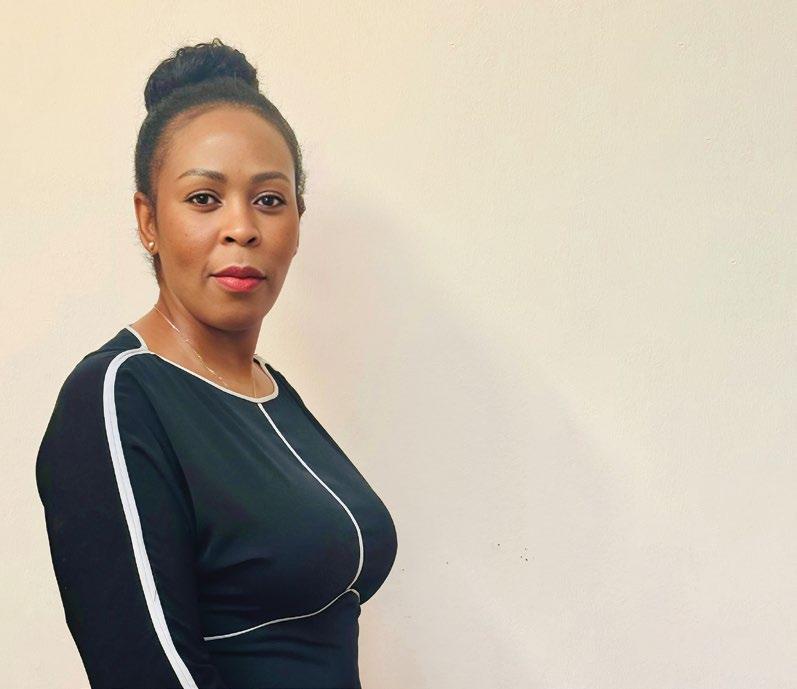
Peuneo positions itself as a provider of complete, industry-specific solutions. What defines your approach?
In my previous occupations as Quality Manager, Project Manager, Training Manager and General Manager, I was often required to spearhead organisation-wide goals relating to Operations optimisation – including quality improvements and waste reduction of different resources – as well as change management. Often, in these delegations, the departments entrusted to me were new. This meant that some of my core deliverables were systems (and processes) engineering as well as team establishment and change management, which included the process of culture shifting, often underpinned with skills development.
The difference following training was truly notable. Here, my passion for skills transfer was born; and I am immensely grateful that as a culture, the team at Peuneo carries this passion in all we do. We are fuelled by the constant feedback we receive from our clients when they relate the difference they experience at work after implementing our solutions.
We love reverse-engineering our clients’ goals to tailor the solutions that help achieve the desired outcomes.
Your training goes beyond skills transfer to driving sustainable change. How is this achieved in practice?
As the saying goes: “Do what you love, and you will
never have to work a day in your life.” The truth is that passion is also transferable.
When the clients see the big picture of implementing training in addition to any solution, and when the classroom delegated sees the same, synergy is ignited and learning becomes widespread and more pleasant.
Beginning with the end in mind in key.
Which sectors are you currently active in, and where is the most growth coming from?
We are active in quite a number of sectors. Having started in the OHS (Occupational Health & Safety) and Labour Relations fields, we have been stretched by client requests to such an extent that we now service several other sectors as well. They include:
1. Power Generation
2. SETAs/Education Sector
3. Mining
4. The Health Sector, including Optometry
5. Service Sector
6. Manufacturing and Engineering
7. ICT Sector
8. Construction
How does Peuneo align its work with national transformation and capacity-building goals?
The National Development Plan is a policy that is very close to our hearts here at Peuneo.
We continue to see immense positive change in the organisations we serve, as well as in the learners sponsored by these organisations. In reporting on these changes, attempts are often made to measure the difference in the trajectory of the individuals positively affected by our upskilling programmes. Still, though it’s estimated that for every single skilled learner, a family of up to 10 could be positively impacted, it is likewise acknowledged that the change is way more far-reaching when the entire community is taken into account. The trickle effect of an individual’s increased employability, to their positive role-modelling capacity and knowledgeable mentoring is immeasurable.
Our dream at Peuneo is to continue to play a role in this capacitation plan. And let’s not forget the positive effect on the longevity and sustainable growth of the organisations that we and our graduates gratefully serve.
The trickle effect of an individual’s increased employability, to their positive role-modelling capacity and knowledgeable mentoring is immeasurable."
Your team’s diverse expertise spans construction, SHERQ, ISO standards, and more. How does this benefit clients?
At Peuneo, we involve the experts in each specific case, including the training interventions we provide. This means that whether we are training or implementing a solution, each service is infused with the relevant expert experience in that field, combined with innovations that inform the way forward.
The mix of experts in our team allow us an holistic perspective which informs our solutions and services, enriching the outcomes in a wide range of areas.
Can you share a standout project that reflects Peuneo’s impact?
This is not an easy ask indeed, as it is common for us to hit the target as stated before.
Some of the regular feedback we receive from CEOs, directors, managers and learners alike include:
• Waste yards being used for other needs as waste is drastically reduced, speaking to positive and increased ROI
• Learners are able to be delegated to multiple functions in the organisation
• Reduction in unrest due to synergy
• Career progressions for our learners
• Injuries and non-conformances drastically reduced
• Ease of delegation
What is your vision for Peuneo over the next few years?
We absolutely enjoy walking the change and growth path with our clients and learners. It will be a pleasure and honour to continue doing this and have opportunity to do the same for more.

Marriott International’s ambitious plans for expansion across Africa, with over 50 new properties set to open by 2027. We spoke with Karim Cheltout, Marriott International Senior Vice President of Development: Middle East & Africa, to explore the company’s growth strategy, job creation and skills development across the continent.
KARIM CHELTOUT SENIOR VICE PRESIDENT OF DEVELOPMENT
How is Africa’s hospitality landscape evolving?
We’re seeing excellent momentum in the hospitality industry in Africa. Urbanisation is accelerating, creating a demand for quality accommodation in commercial hubs, while a growing middle class is fuelling domestic and intraAfrica travel. People are travelling for business, leisure, or both – a trend shaping how and where we develop. Importantly, airlift and regional connectivity are improving. Governments and the private sector are investing in airports, airlines and visa reforms, making multi-destination trips more feasible and opening underserved locations. The combination of infrastructure development and policy reform is laying a foundation for long-term growth. Marriott is aligning with these shifts by expanding thoughtfully, with brands tailored to local demand.
Can you share details on Marriott’s expansion plans, target markets and key growth drivers? We plan to open over 50 new hotels and more than 9 000 rooms across Africa by the end of 2027. We’re especially excited about Marriott’s anticipated entry into five new markets: Cape Verde, Côte d’Ivoire, the Democratic Republic of Congo, Madagascar, and Mauritania. This reflects strong investor interest and a rising demand for branded hospitality.
Africa is home to emerging marketplaces that offer significant growth opportunities across major gateway cities, commercial centres, safari circuits and resort destinations. Our strategy spans luxury, premium, and select-service segments. We expect growth across the continent to be largely driven by our select-service brands, including Protea Hotels by Marriott and Four Points by Sheraton, and a strong consumer demand for distinctive, high-quality hospitality experiences. High-growth markets include Tanzania, Egypt, Morocco, Kenya, and Nigeria, together accounting for more than half of the anticipated openings over the next two years. Conversions and adaptive reuse represent more than 30% of expected additions, and we’re also seeing growing interest in branded residential projects.
What makes brands like Aloft Hotels suitable for Africa, and what do they offer the sector?
Aloft is a great fit for Africa’s youthful and dynamic demographic. The brand delivers a fresh, forward-thinking hotel experience, with modern, flexible spaces that encourage social interaction through everything from cocktails to gaming. We’re excited about the debut of
Aloft Hotels in Africa, with the anticipated opening of Aloft Ghazala Bay on Egypt’s North Coast expected in 2027.
With the rise of adventure travel, how is Marriott tapping into luxury safari tourism?
Adventure and outdoor travel are growing fast, and we’re leaning into that trend. After our successful opening of JW Marriott Masai Mara Lodge in 2023, we’re now ready to open six more safari properties in East Africa by the end of 2027. These include The Ritz-Carlton Masai Mara Safari Camp in Kenya and the Mapito Safari Camp, Serengeti Autograph Collection in Tanzania — both scheduled to open this year. These projects reflect our commitment to luxury in extraordinary natural settings, meeting demand for immersive, high-end travel experiences.
How is Marriott supporting local talent development and job creation with this expansion?
Hospitality has the power to drive real economic impact, and we’re committed to developing talent in local communities. In South Africa, our Accelerate Programme gives high school graduates access to education and hands-on experience, while our Voyage programme offers university graduates structured training across Africa, including mentorship and career planning. In Egypt, we partner with Helwan University on Tahseen, a fouryear programme combining academics and operational training. Khulanathi in South Africa helps fast-track highpotential associates into management, actively tackling equity and gender gaps. These efforts support a skilled, resilient workforce, which is vital for the sustainable growth of Africa’s tourism and hospitality sector.
How is Marriott using the franchise model to drive hotel development in Africa?
We’ve seen growing interest in the franchise model, particularly over the last five years. Many developers want more control over operations and are building the capacity to manage hotels themselves. Our franchise model supports this by offering owners greater decision-making power while still leveraging Marriott’s global brands, marketing reach, loyalty programme, and booking systems.
We work closely with franchisees to ensure brand standards are met to ensure a consistent high-quality guest experience. This model is unlocking hotel development by aligning with investor needs and promoting local ownership and operational expertise.
Maximising your Socio-Economic Development (SED) contributions is key to improving your B-BBEE score and driving meaningful community impact.
By Anton Visser, COO of SA Business School
Socio-Economic Development (SED) represents one of the five core elements of South Africa's Broad-Based Black Economic Empowerment (B-BBEE) scorecard, carrying significant weight in determining your business’s overall B-BBEE level. Understanding how to maximise these points is crucial to improving your transformation credentials and accessing broader market opportunities.
Understanding the SED element
The SED element focuses on contributions that benefit black people and communities, particularly in areas of education, healthcare, and community development. Under the current B-BBEE Codes of Good Practice, SED carries a weighting of 5 points on the generic scorecard, making it an important and substantial contributor to your overall B-BBEE score.

To achieve maximum SED points, your business must spend at least 1% of your Net Profit After Tax (NPAT) on qualifying SED initiatives. This is calculated using the average of the three preceding years of audited financial statements, or since incorporation if less than three years old.
The B-BBEE Codes prioritise certain sectors for SED contributions. To maximise your impact and compliance, focus on the following priority areas for SED investment:
Education and training:
This includes bursaries, scholarships, adult basic education and training (ABET), early childhood development, educational infrastructure, training in communities, and skills development for unemployed people.
Forms of SED contributions include:
• Grant contributions
• Guarantee or security provided
Healthcare:
Contributions may include support for healthcare facilities, medical equipment, health awareness programmes, and community health initiatives.
• Direct costs incurred in assisting beneficiaries
• Overhead costs which are directly attributable
• Developmental capacity advanced to communities
• Preferential terms granted for supply of goods or services to beneficiary communities
• Payments made to third parties to carry out SED initiatives on behalf of the enterprise
• Provision of training or mentoring to beneficiary communities
• Maintenance of a dedicated SED unit within the enterprise focused solely on supporting beneficiaries and their communities
These amounts are measurable by quantifying the cost of time spent by the staff or management of the enterprise in carrying out such initiatives, excluding travel or commuting times.
SED contributions are any monetary or non-monetary contributions implemented for individuals or communities where at least 75% of the beneficiaries are black people. SED contributions are recognised annually and need to be quantifiable as a monetary value.
Developing a multi-year SED strategy
Rather than making ad hoc contributions, develop a comprehensive three- to five-year SED strategy that aligns with both your own business objectives and the target community’s needs for maximum impact. This
Community development:
Key areas include housing projects; sports development; arts and culture programmes; environmental conservation; development programmes for women, the youth, people with disabilities, and people living in rural areas.
approach offers several advantages, including better budget planning and cash-flow management, stronger community relationships and impact measurement, enhanced reputation, stakeholder engagement, and improved B-BBEE verification outcomes.
Implement a systematic approach to SED planning with:
1. Annual budget allocation: Set aside your required SED contribution at the beginning of each financial year.
2. Quarterly reviews: Monitor spending patterns and beneficiary outcomes.
3. Impact assessment: Measure and document the social impact of your contributions.
4. Stakeholder reporting: Communicate your SED achievements to stakeholders and communities.
For maximum impact, adopt an integrated B-BBEE approach and align your SED strategy with other B-BBEE elements. This can be achieved by, for example, supporting black-owned businesses through your Enterprise and Supplier Development initiatives, developing SED programmes that create employment opportunities, and investing in skills development programmes that benefit your supply chain.
Also consider the geographic location of your SED contributions and prioritise communities in which your business operates. Focus on areas with high unemployment and poverty levels and align with government development priorities and plans.
The SA Business School SED Solution for business
SA Business School has developed our SED programme with the sole focus of tackling South Africa’s raging youth unemployment crisis. The vast majority of unemployed individuals struggle to obtain interviews, and when they do, they are often unprepared and lacking the confidence and skills needed to persuade a prospective employer to hire them.
Our SED offering is a highly focused employability skills training solution that focuses on developing the core skills demanded by employers as well as the interview preparation and techniques required to best display their potential. Ultimately, it’s about developing young people that are ‘work-ready’ and confident enough in their skills to compete effectively in the world of work. Beneficiaries are sourced and vetted by SA Business School and trained here by our accredited and qualified facilitators. We also provide all the supporting documents for your B-BBEE verification.
The benefits of our skills training for beneficiaries include:
• We teach essential skills such as problemsolving, critical thinking, adaptability, learning agility, connectedness, resilience, curiosity, and a growth mindset – all skills highly sought-after by employers and vital in today’s rapidly evolving world of work.
• Professional CV development
• Professional presentation skills
• Practical preparation covering what to expect in interviews, handling the tough questions, and techniques to present themselves effectively
The key is to view SED not merely as a compliance requirement, but as an opportunity to create shared value... "
Many businesses fail to achieve maximum SED points due to rushed spending decisions close to deadlines, insufficient beneficiary verification, poor record-keeping and documentation, and lack of impact measurement. Without a strategic approach to SED and proper planning, many businesses discover too late that they are contributing to organisations and projects that don’t qualify under B-BBEE regulation and/or have insufficient black beneficiary percentages along with missing or incorrect documentation, consequently leading to the failure of the contributing business to obtain proper tax exemption certificates.
Maximising your B-BBEE SED points requires strategic planning, proper implementation, and meticulous documentation. By focusing on qualifying sectors, ensuring beneficiary compliance, maintaining comprehensive records, and regularly measuring impact, your business will not only achieve maximum B-BBEE points, but it can also contribute meaningfully to South Africa’s socio-economic transformation.
The key is to view SED not merely as a compliance requirement, but as an opportunity to create shared value between your business and the communities you serve. This approach ensures sustainable impact while strengthening your B-BBEE credentials and broader business reputation.

Remember that B-BBEE verification is an annual process, and consistency in your SED contributions demonstrates a genuine commitment to transformation. Start planning early, engage with communities meaningfully, and maintain rigorous documentation to ensure you maximise your SED points year after year.

Master of Business Administration (MBA) with a Digital Transformation Lens
Postgraduate Diploma in Business Administration with a Digital Transformation Lens
Postgraduate Diploma in Public Policy and African Studies
Doctor of Philosophy (DPhil) in the field of Digital Transformation

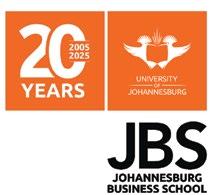

THE JOHANNESBURG BUSINESS SCHOOL IS A THOUGHT LEADER IN LEADERSHIP DEVELOPMENT, OFFERING POSTGRADUATE QUALIFICATIONS RELEVANT TO THE DYNAMIC FUTURE THE WORLD IS FACING.
THE FUTURE OF BUSINESS BELONGS TO THOSE WHO REIMAGINE IT.

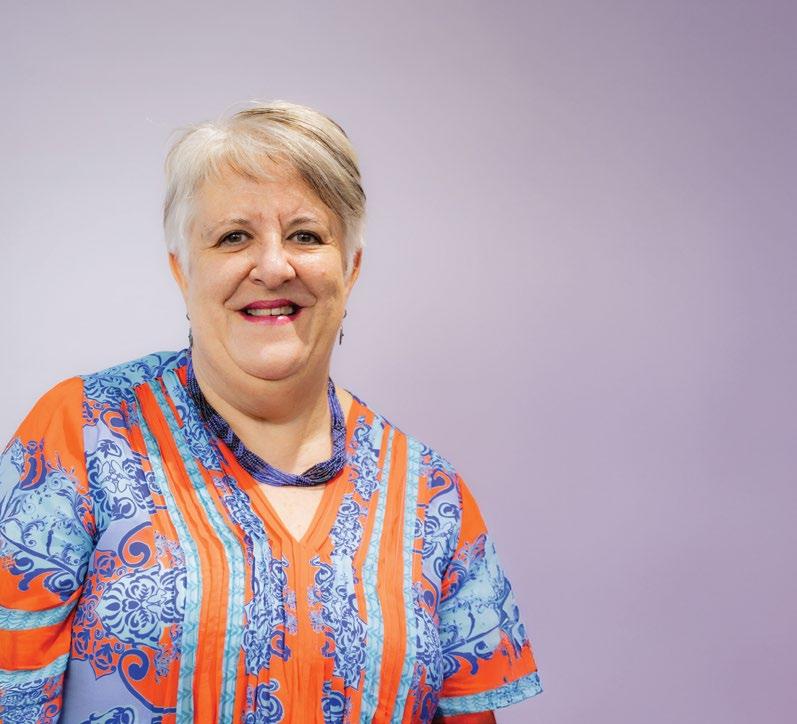
In a fast-changing business landscape, how do you ensure that JBS graduates are academically equipped and future-fit?
It is very important to collaborate with industry and understand what the needs are in the workplace. We also need to keep up to date with what is happening in the world of work and world of business to ensure we prepare graduates for the world after their studies.
What role should African business schools play in driving inclusive economic transformation across the continent?
Business schools need to entrench ‘the African way’
Under the leadership of Professor Adri Drotskie, the Johannesburg Business School is taking a bold, practical approach to business education – one that reflects Africa’s unique context while meeting global standards.
and the unique challenges of Africa in the curriculum and content of what we teach. We at JBS are focusing on African case studies and collaboration with African business schools to develop our own African content.
How do you see technology reshaping executive education, particularly in markets like South Africa, where access and equity are still major issues?
Most executive education programmes are focused on leadership and the soft skills required in the workplace. These skills are taught and entrenched most effectively through face-to-face interaction. We therefore offer
programmes in hybrid mode, where students come to class for some modules or we meet them in their organisations, and some are taught online.
Students need to understand the way we do business and grow business in Africa. Firstly, we need to visit Africa to understand Africa. You can’t talk about a country, city or town in Africa while sitting in Sandton.”
JBS positions itself as a disruptor in business education. What does meaningful disruption look like in this space?
We challenge students to do critical thinking, problem solving and design thinking through practical projects, thereby readying or equipping them for any disruptors coming their way.
How do partnerships – with industry, government, or other universities – strengthen the long-term vision of JBS?
Partnerships are critical for a business school. At JBS we offer masterclasses and seminars/webinars where we get industry and government to come and talk to the students. We also send our students to other global universities to participate in multidisciplinary research projects. We need to establish a worldview for students so they understand the complexities and uncertainties of a broader world, rather than just the world they are used to in their own environment.
In building curricula that reflect African realities, what are the biggest knowledge gaps business schools need to address?
The biggest gap is African-based case studies. We need to work with cases of businesses or entrepreneurs that reside in Africa. Students need to understand the way we do and grow business in Africa. Firstly, we need to visit Africa to understand Africa. You can’t talk about a country, city or town in Africa while sitting in Sandton.
What are some common misconceptions global audiences have about African business education, and how do you challenge them?
The global business world sees Africa as an emerging or developing market or continent. That might be so, but we at JBS educate students to be ready for leadership, management and business in a globally developed world. We have a unique worldview and it should be incorporated in any discussion on how to tackle global issues and challenges.
What’s one piece of advice you consistently give to emerging business leaders in your classrooms?
They need to understand the context in which we do business and lead people in 2025 and into the future. The theoretical principles stay the same, but the context within which we need to apply it is changing by the hour. We also need to equip business leaders with soft skills. Staff wellbeing and mental health are crucial issues moving forward, and companies and their leaders need to know how to deal with these challenges.
Professor Adri Drotskie is the Acting Dean of the Johannesburg Business School, University of Johannesburg (UJ). She had previously served as Director of the School of Management at UJ since 2020 and, from 2018 to 2020, was Head of Research and Faculty Development at Henley Business School Africa, where she founded the #HenleyAIR research centre. With extensive experience in strategic management, international business, and marketing, she has also led the MCom (Business Management) programme at UJ, making it the top-ranked in SA. Prof Drotskie’s experience in strategy development and implementation spans 30 years across the transport, financial services, and academic sectors.
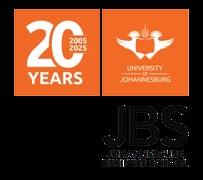

Mentorship is how women in tech turn influence into impact. For Zinia Connect Director Carmen Hargroves, it’s about more than advice – it’s opening doors, creating visibility, and inspiring the next generation to lead boldly in an industry that’s still male-dominated.
Despite the fact that many of the “firsts” in IT history were achieved by women (way, way before Bill Gates and Steve Jobs, et al), the modern IT landscape is still dominated by males. However, women are stepping up, gaining more visibility, and building influence, and mentorship is becoming more than just career advice –it’s a form of advocacy. For Carmen Hargroves, Corporate Director at Zinia, a leading technology group in South Africa, mentorship is both a responsibility and a privilege.
“As women in tech, we don’t just need to be good at what we do – we need to show other women that it’s possible for them.” Hargroves explains. “Being a mentor means sharing not just your technical knowledge, but your hard-earned lessons, too. It’s helping other women see possibilities where they might have seen only barriers.”
Mentorship plays a pivotal role in building futureready teams and more inclusive workplaces, says Hargroves. “Representation matters. When women see other women in leadership, they believe it is possible for them too,” she says. “Most of us didn’t get here on our own. Mentorship is how we honour those who helped us – by paying it forward.”
For Hargroves, it’s not mere lip service; she has mentored dozens of women, guiding them through the challenges of the industry, especially with regard to navigating the glass ceiling. She views mentorship as a core leadership function – one that has the power to transform culture and career trajectories alike.
Carmen Hargroves shares her top five habits for mentoring in the workplace:
1. Lead with active listening
Mentorship starts with listening and understanding your team – their goals, challenges and strengths. When people feel truly heard, they’re more likely to trust your guidance and open up to meaningful growth.
2. Model growth and vulnerability
Your team needs to see that you’re growing too. It builds trust and psychological safety. By being open about your own journey, you show that leadership is a process, not a destination.
3. Set intentional development goals
It’s not just about giving advice. It’s about helping to shape your team’s path. Clear goals create direction, accountability, and a sense of progress that fuels confidence and motivation.
4. Create visibility

Women and underrepresented team members are often overlooked. Mentorship includes sponsorship – creating opportunities for them to be seen. Advocating for your team in the rooms they’re not yet in is one of the most powerful things a mentor can do.
5. Build feedback into culture
Regular, constructive feedback improves confidence. Aim to create a space where feedback is a tool for growth, not criticism. It should empower, not diminish. When done right, it becomes a mirror for development, not a magnifying glass for flaws.
As companies across South Africa push toward more inclusive leadership, Hargroves’s message is clear: mentorship is an essential in the workplace. It is how women leaders amplify their impact and help build a more equitable, empowered future. “When you lift others up, you don’t lose your place – you extend your legacy,” she says. “That’s the true power of mentorship.”
15 – 16 OCTOBER
Where: Cape Town International Convention Centre
Solar & Storage Live Cape Town returns, showcasing South Africa’s energy evolution with solar power, advanced storage solutions, clean energy innovations, and market disruptions shaping the future
15 – 16 OCTOBER
Where: Sandton Convention Centre
The fourth Sustainability & ESG Africa Conference, happening October 15-16, 2025, in Johannesburg, gathers industry leaders to discuss sustainability and ESG implementation challenges.
30 OCTOBER
Where: Johannesburg
This summit unites banking leaders, fintech innovators, and stakeholders to shape Africa's connected banking future.
30 – 31 OCTOBER
Where: Cape Town
The AWIEF Conference & Exhibition brings together key players in the African entrepreneurial ecosystem to engage in impactful dialogue, share good practices, and foster collaboration.
5 – 7 NOVEMBER
Where: Johannesburg
Join the 10th Annual Good Governance Africa Conference, uniting Africa’s governance leaders to shape ethical leadership and ESG excellence.
13 – 14 NOVEMBER
Where: Newlands, Cape Town
The WIN Festival 2025, promoting women's empowerment, takes place Nov 13–14 at Newlands Cricket Ground, Cape Town.
18 – 20 NOVEMBER
Where: Cape Town International Convention Centre Over 10 000 global participants join the International Commodity Summit 2025 to network, explore trends, and secure trade deals.
24 – 26 NOVEMBER
Where: Cape Town International Convention Centre Africa must rethink agriculture amid crises. The Agri Investment Indaba 2025 in Cape Town will focus on investment, innovation, and policies for a self-sufficient, sustainable food future.
25 – 26 NOVEMBER
Where: Durban
Ports & Rail Week is a pan-African conference and exhibition that brings together key stakeholders from the maritime and rail sectors to explore innovations, infrastructure investment, and strategic partnerships.
9-12 FEBRUARY 2026
Where: Cape Town International Convention Centre
A key event for industry leaders and investors to network, explore opportunities, and promote sustainable growth. The 2026 agenda is packed with insights and opportunities.
To showcase your upcoming events, contact Maurisha Niewenhuys: maurisha@mediaxpose.co.za